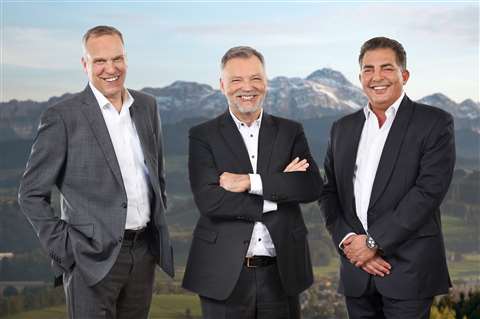Swiss Clean Battery to open world’s first solid-state battery plant
08 April 2022
Swiss Clean Battery (SCB) has revealed plans for a new solid-state battery production plant. The facility is reported to be the first of its kind in the world. SCB was founded in February 2022 in Frauenfeld, Switzerland.
In the first production phase the plant will deliver 1.2 GWh of batteries per year from 20,000 square metres of floorspace. Anticipated output is 7.2 million battery cells. The goal is to produce 7.6 GWh per year from 100,000 square metres, representative of 48 million cells.
All related machinery for production will be sourced from within Switzerland and Germany in an effort to reduce logistics costs and secure supply chains.
 Peter Koch CFO, Roland Jung CEO, Thomas Lützenrath COO of Swiss Clean Battery
Peter Koch CFO, Roland Jung CEO, Thomas Lützenrath COO of Swiss Clean Battery
Solid-state batteries, long-regarded as the successor to li-ion fomulations, offer a series of performance benefits. Where li-ion batteries can last up to 2,000 charging cycles, solid-state batteries have an almost indefinite lifespan.
Instead of suspending the anode and cathode in a liquid electrolyte, solid-state products compress the anode and cathode against the solid electrolyte in a material sandwich.
One of the key issues with development of solid-state products is establishing a stable connection between the electrodes and the fixed ion conductor. In many cases, a modular production systems means components are produced outside the cell and inserted into the housing, leading to problems with the ion transfer process.
SCB claims that this issue has been solved by fixing the ion conductor within the battery cell during production. This eliminates issues related to the modular construction method.
The solid-state batteries are capable of managing deep discharge and fast charging, two factors which can harm li-ion products. They are also non-combustible, plus they do not use increasingly expensive raw materials, such as cobalt.
SCB says that solid-state batteries offer an environmental improvement of 50% over conventional li-ion products.
A series of companies have been working on development of solid-state technology. In 2020, Toyota put forward that it would ‘commercialize’ the tech by 2025, although the batteries would first feature in a hybrid rather than pure electric vehicles.
This was due to the cost of the batteries – an issue which could have already been addressed with increasing raw material prices for li-ion cells – and hybrids serving as an appropriate test bed for the tech due to multiple charge/discharge cycles.
STAY CONNECTED




Receive the information you need when you need it through our world-leading magazines, newsletters and daily briefings.
POWER SOURCING GUIDE
The trusted reference and buyer’s guide for 83 years
The original “desktop search engine,” guiding nearly 10,000 users in more than 90 countries it is the primary reference for specifications and details on all the components that go into engine systems.
Visit Now
CONNECT WITH THE TEAM










